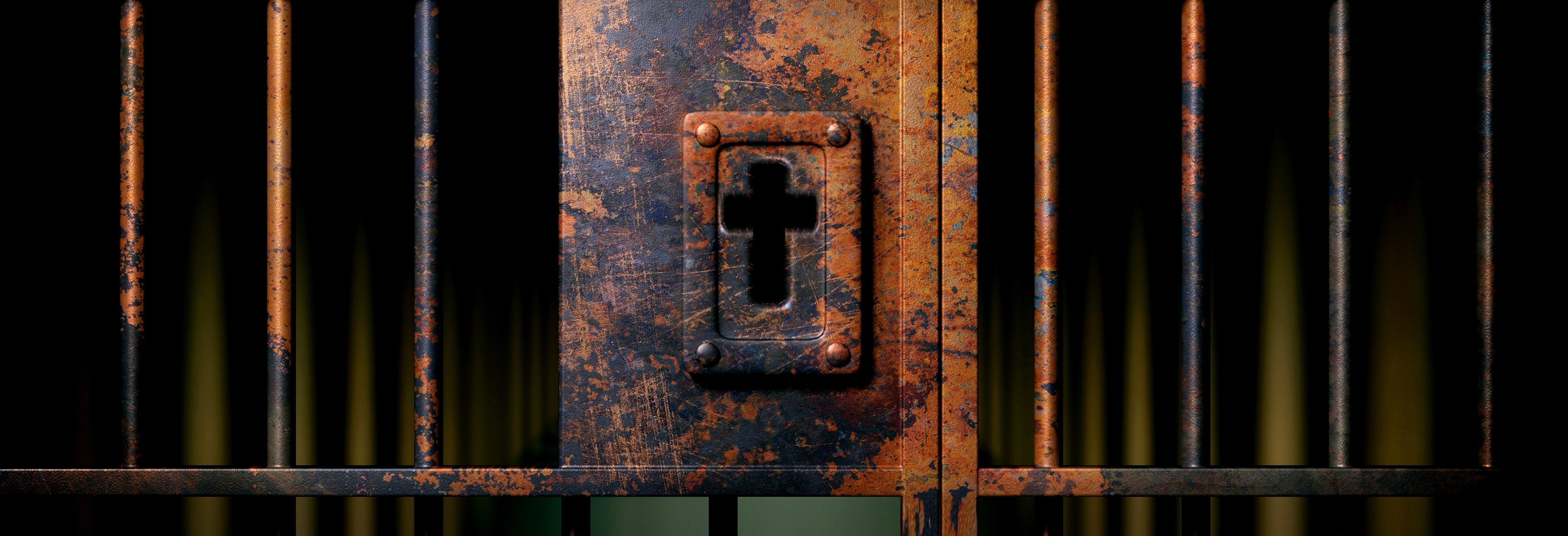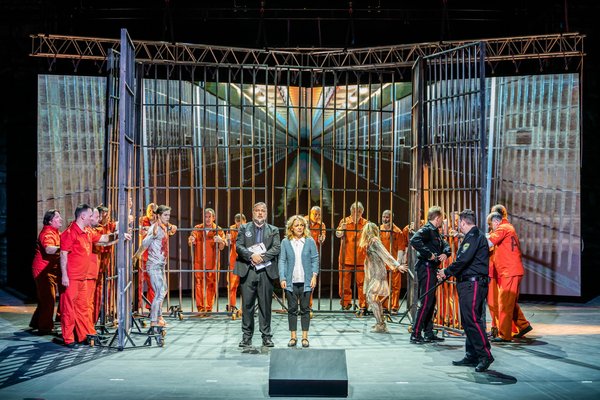
DEAD MAN WALKING
3 May 2025, 6:30 p.m.
In Brief
Opera in two acts, in English, with Hungarian and English surtitles
Jake Heggie’s opera Dead Man Walking poignantly reveals the reality of the death penalty, as well as the internal conflicts of the condemned prisoners and those who resist social pressure in order to help them. The San Francisco Opera commissioned Heggie to write his first opera based on the actual events related in Sister Helen Prejean’s world-famous book. This was also the first opera libretto created by dramatist and musical librettist Terrence McNally, who is also credited with Kiss of the Spider Woman and The Full Monty. The critics hailed the work enthusiastically for its courageous portrayal of both the convict and his family and the justice of the point of view of the parents of the victims.
By arrangement with Bent Pen Music. Sole Agent: Bill Holab Music.
This Opera was commissioned by the San Francisco Opera.
Details
- Location
- Eiffel Art Studios – Miklós Bánffy Stage
- Date
- May 3, 2025
- Start time
- 6:30 p.m.
- End time
- 9:30 p.m.
Synopsis
A boy and a girl are out on a date in rural Louisiana. Sitting by a lake, they listen to music and then kiss. Suddenly two figures emerge from hiding nearby: they are the brothers Anthony and Joseph De Rocher. Anthony seizes the boy, and Joseph brutally sexually assaults the girl. The boy continues to struggle with Anthony, who pulls out a gun and shoots him in the head. The girl screams at the sound of the gunshot. Panicking, Joseph produces a knife and stabs her to death.
ACT I
At Hope House, Sister Helen Prejean is teaching a group of children a hymn. As the children leave, she tells her fellow nuns that she has accepted a request from an inmate on death row to serve as his spiritual adviser. Warned of the dangers, she nevertheless remains adamant about performing her duty as a member of the Christian clergy. As she drives to “Angola”, the maximum-security Louisiana State Penitentiary, she contemplates the decision she has made.
Arriving at the prison, Sister Helen is met by Father Grenville. He warns her that it will be impossible for her to reach through to Joseph. She informs the priest that she plans to fulfil her obligations. Father Grenville introduces her to Warden Benton, who also cautions her about the perils of facing Joseph. Sister Helen meets Joseph who is more approachable than she had been told he would be. He asks her to attend the pardon board meeting.
At the pardon board hearing, Joseph’s mother and younger brothers plead for his sentence to be reduced to life imprisonment. Owen Hart, the father of the murdered girl, hears Joseph’s family’s pleas and erupts in anger. Afterwards, the families of the victims confront Joseph’s family and Sister Helen. At that moment, word comes from the pardon board that Joseph will not be granted clemency – he will die for his crime, barring intercession from the governor. When Sister Helen informs Joseph of what has happened, he grows angry and accuses Sister Helen of abandoning him. Sister Helen says she will never leave his side, but encourages him to confess his crime and ask for forgiveness. Joseph refuses.
As she searches her purse for some change to use in the vending machine in the waiting room, Sister Helen begins to hear the voices of her students, her fellow nuns and other people in her life pleading with her to stop aiding Joseph. Her reverie is interrupted by the presence of Warden Benton: the governor has refused to commute Joseph’s death sentence. Sister Helen faints.
ACT II
Joseph is informed that his execution date has been set and reflects on his fate. Back at Hope House, Sister Helen wakes up from a nightmare. Sister Rose begs her to stop working with Joseph, insisting that it will destroy her health. Nevertheless, bound to her vows, Sister Helen persists.
On the evening before Joseph’s execution, Sister Helen and Joseph pass the time discussing their mutual love of Elvis. Before departing, Helen once again urges Joseph to confess and ask forgiveness, but he refuses. Joseph’s mother and two younger brothers enter. Joseph attempts to apologise to his mother for what he has done. His pleas, however, fall on deaf ears: Mrs De Rocher cannot believe that her son is truly guilty of such a heinous crime. As Joseph is led away, his mother breaks down. Helen attempts to comfort her.
Outside the execution chamber, Sister Helen meets with the victims’ parents. They ask her if Joseph has asked her to deliver any message to them, and she is forced to tell them that he had nothing to say to them. They again lash out in anger. Mr Hart, however takes Sister Helen aside and confides that he is not sure that he wants Joseph to die after all, and that he and his wife have separated. Sister Helen consoles him, and they part ways.
In the final minutes before Joseph’s execution, he and Sister Helen talk one last time. Sister Helen again urges him to confess. He finally breaks down and confesses. Sister Helen forgives him and instructs him to look at her during the execution: she will be his source of comfort. The warden comes to escort Joseph to the execution chamber.
In the execution chamber, Joseph is strapped down to receive the lethal injection. The warden asks if Joseph has any last words. He asks for the parents of the murdered teenagers to forgive him. The warden then signals for the execution to proceed. With his dying words, Joseph tells Sister Helen that he loves her.
Gallery
Reviews
"It is a comprehensible, good directorial concept for Jake Heggie's first opera, Dead Man Walking at the Hungarian State Opera in Budapest (...) The director guides the main characters and the orange-coloured, Guantanamo-like prisoners through skillful scene changes and video projections in a coherent and confident manner. (…) The final scene is particularly moving."
Helmuth Christian Mayer, Opera Online
